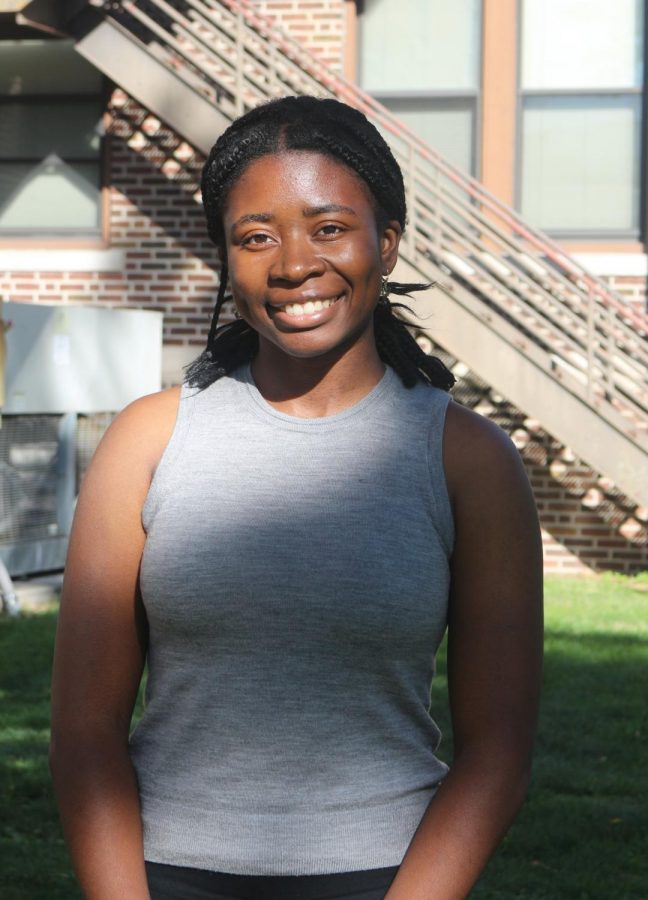On the same Paige: sexplanations and other equity tips
Paige Olowu `22 is offering advice about well-being on-and off-campus.
October 10, 2022
Sexplanations and Other Equity Tips is an anonymous Q&A column centering on all things related to sex, gender and healthy relationships. It serves as an educational resource aimed at increasing access to information, normalizing healthy behaviors and promoting a culture of sexual respect on campus. Questions will be answered by Post Baccalaureate Prevention and Outreach Coordinator, Paige Olowu `22, in collaboration with the Title IX office.
“Am I a bad person for wanting to end things with my girlfriend from home? I think I’m starting to want different things.”
You absolutely aren’t a bad person for taking some time to reflect on what you want! I think this is a natural thought for a lot of people who come into college already in a relationship. College is a time for self-discovery. From my experience, it can be a place where you learn who you are, what you want and need and where you’re going in life. Your question sounds like you may be looking at some type of change in the dynamic of your relationship. Over time, the nature of relationships can transform due to personal developments or shifting circumstances (like going to different colleges). Long-distance relationships can be draining and it’s okay to take some time off if that’s what you need. The longer you’ve been with someone, the harder it may be to shift the dynamic of your relationship from romantic to platonic or maybe even something else. I understand feelings of guilt associated with even wanting an adjustment, but not being honest with your feelings and staying in a relationship you don’t want may be more damaging to your girlfriend than just ending things.
When exploring your options, it’s always helpful to communicate your thoughts and feelings with others; this could be a conversation with your friends and family. Even though it may not be easy, you should communicate with your girlfriend from home. “Ending things” doesn’t have to be a sign of hate or disdain for the other person involved. In fact, discussing where you’re at emotionally can be a gesture of caring, self-awareness and respect for the relationship. It is possible to move from a romantic relationship into a new platonic configuration. Often it just takes time, communication and some mental adjustments. Best of luck to you!
“As wild as it sounds, someone slid into my YikYak DMs and we’ve been talking. I feel weird about meeting up with them though.”
The way in which we communicate and meet each other is constantly changing. Just two years ago I would have thought it was wild to take a dance class completely online, but that’s exactly what fall 2020 had in store for me. Now relationships can begin, exist and be sustained entirely online. Meeting someone via YikYak DMs could absolutely be the start of a beautiful love story. However, unlike many modern dating apps, YikYak is an entirely anonymous platform. There is no way of knowing the person you’ve been conversing with is actually who they say they are. If you choose to continue chatting or plan to meet up, I encourage practicing basic online safety. This includes, but is not limited to, withholding personal information, meeting in a public or familiar place and being wary of odd or inappropriate requests. Like with all things (and especially in ambiguous instances like this), I think it’s best to listen to your gut and trust your instincts. Happy Yakking!
“I feel like people here only have sex drunk.”
It’s completely valid to feel that way. I’m sure walking through D-Hall and overhearing some Sunday morning conversations would cause many people to agree with you, but actually, most Grinnellians prefer sober sex. Not to bore you with statistics, but the perception that Grinnellians prefer to have sex while intoxicated was not reflected in our last Sexual Climate Survey (conducted by Professor Chris Ralston’s MAP team) or data collected from the College’s last American College Health Association National College Health Assessment.
Trends with data points from 2013, 2015 and 2018 show a statistically significant increase in students who self-reported having oral, anal or vaginal sex in the last 30 days before taking the survey. They also self-reported being sober for 75% or more of their sexual encounters, from 53.8% in 2013 to 70.6% in 2018. Additionally, the percentage of students who self-reported having sex in the last 30 days and self-reported never being sober for sex decreased significantly, from 23.8% in 2013 to 7.8% in 2018. While the percentage of students who self-reported that they preferred to be intoxicated when having sexual contact with someone else held relatively steady (13.9% in 2015 and 11.4% in 2018), the percentage of students who reported that they thought the typical Grinnell student preferred to be intoxicated if they were going to have sexual contact with someone else decreased by almost half, from 50.6% in 2015 to 24.2% in 2018.
When making sweeping statements, I err on the side of caution. Engaging in sex can be a vulnerable act; I’ve heard of instances when people choose to drink alcohol to relax their inhibitions and others who choose to abstain from drinking to have an intimate experience with their partner. As long as it is consensual, individuals should act in ways that make them most comfortable. Regardless of where you fall on the sexual spectrum, as a campus we can promote more accurate social norms and attitudes towards substance-free sex. By becoming more accurate in our perceptions, students should feel empowered to have the kind of sex they want to have.



















































